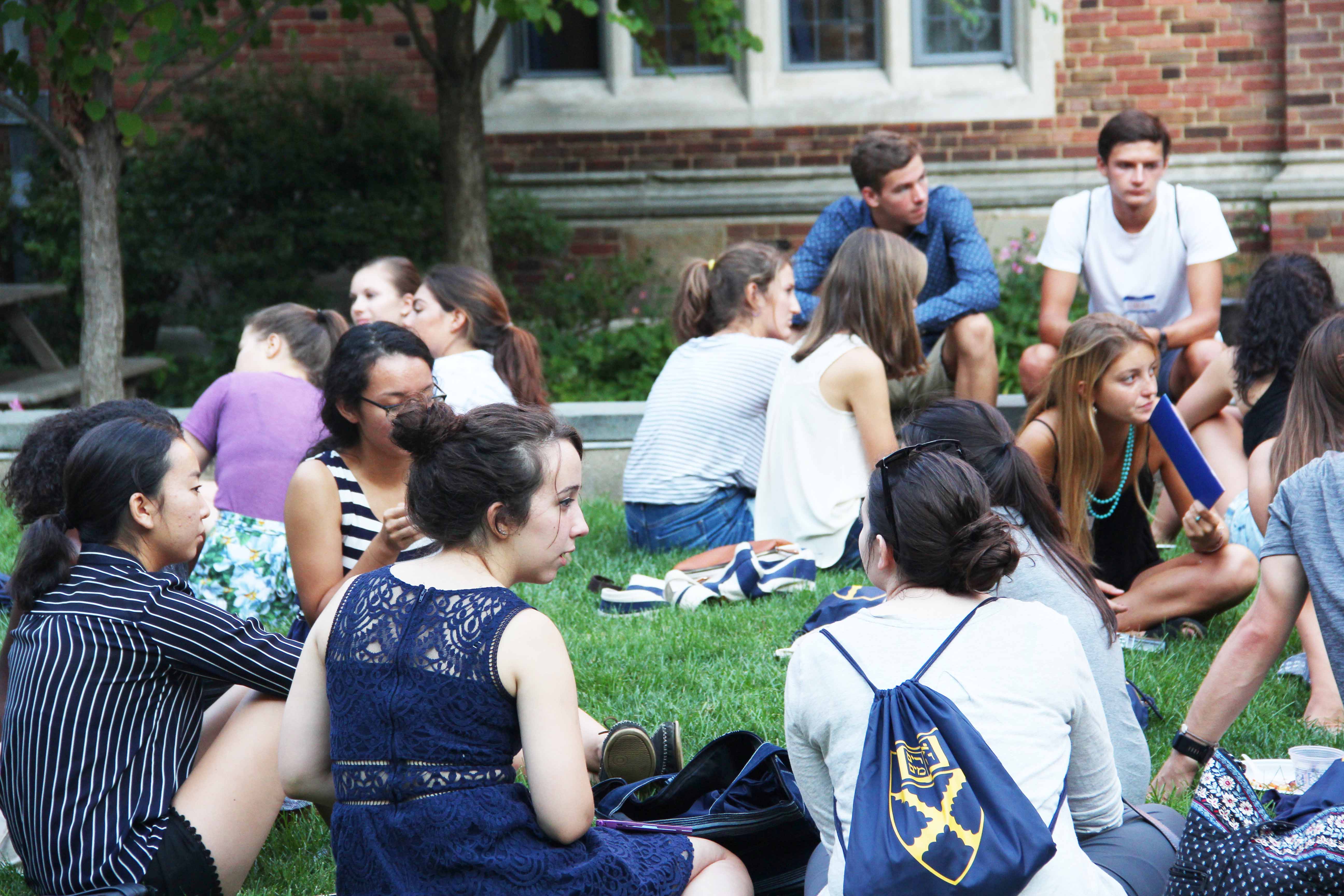
When she was learned she was placed in Calhoun College this June, Hannah Sproch ’20 did not post celebratory pictures online or stock up on college merchandise.
Instead, she steeled herself for what she was sure would be a trying semester.
“I was like, ‘Oh, man, I can already foresee some trouble ahead,’” Sproch said. “If someone asks me what residential college I’m in, I don’t know what to say. I don’t want to say the name.”
In the wake of Yale’s controversial decision last April to keep the name of Calhoun College — named after slave owner and white supremacist John C. Calhoun, class of 1804 — the incoming class of Calhoun freshmen has had to confront an uncomfortable reality: whether they like it or not, they are at the center of a racially charged controversy that promises to divide campus for at least the next few months.
Already, renewed debate over the Calhoun name — fueled by the establishment of a new presidential committee on renaming, as well as outrage over the arrest and forced resignation of an African-American cafeteria worker who smashed a slavery-themed window in the college in June — has made a mark on traditional freshman rites of passage, from orientation meetings to the design of the new college T-shirt. For many, even the seemingly simple choice of what to call the college has become a source of anxiety.
“The freshmen know that they’re in the middle of a contentious space,” Calhoun freshman counselor Lindsey Hogg ’17 said. “There are people who are excited about the idea of being in the middle of this debate, and people who are nervous because they don’t know how they want to be involved.”
More troubling is the social impact of the naming controversy: according to some Calhoun freshmen interviewed, the uncertain status of the name has added an extra dose of awkwardness to the already stressful dining hall introductions that dominate the first weeks of college.
In an Aug. 25 op-ed in the News, Calhoun freshman Isabella Cheng ’20 wrote that freshmen in other colleges judge her harshly just for being in Calhoun, creating an “air of shame and negativity” around the college’s new class.
“The Sorting Hat from Harry Potter did not look deep into my soul and find that I was a secret bigot,” Cheng wrote. “I should not have to worry about whether the content of my character is being scrutinized when I throw on a Calhoun sweatshirt.”
Still, Cheng — who said in an interview that she is not ashamed to introduce herself to peers as a Calhoun student — professed a level of pride in her college assignment that many other Calhoun freshmen interviewed say they lack.
Fatos Karadeniz ’20 told the News that she doesn’t know whether to refer to her college as “Calhoun” or “FKC” for “Formerly Known as Calhoun,” and that she dreads being asked about her college affiliation.
In his introductory email, FroCo James Landefeld ’17 anticipated that reaction, assuring students that although they “may or may not agree with me at this point in time,” they are “so, so lucky to be joining the Calhoun community.”
Head of College Julia Adams told the News that she doubts the incoming class will resent their college placement for long, because Calhoun is a warm and inviting place to live.
And not all Calhoun freshmen will have to be won over. Lulu Klebanoff ’20 — who could have opted into a different college since her brother is in Calhoun — said she was happy to be plunged into the middle of a vigorous debate.
“It’s having this conversation that’s the point of it,” Klebanoff said. “Being at the center of it isn’t a bad thing.”
It has become increasingly clear that the debate over Calhoun will continue into the new semester. In July, University President Peter Salovey established a student and faculty committee dedicated to outlining principles for renaming — an initiative that has moved the Calhoun issue back onto the University’s formal agenda.
Head Calhoun FroCo Isaiah Genece ’17 said he does not want Calhoun freshmen to feel pressured into taking a position in the debate. Genece was part of the team of Calhoun students who created the college’s new freshman T-shirt, which omits the word “Calhoun” and was intended to offer incoming students a neutral introduction to the naming controversy.
On Saturday, at the annual Calhoun freshman barbecue, students gathered in the courtyard to collect the new T-shirt, a navy blue design with a yellow “C” on the breast. But just a few days into the new year, it remains to be seen how the latest iteration of the naming debate will ultimately affect the incoming class.
Last year, Salovey and Yale College Dean Jonathan Holloway made the Calhoun name the centerpiece of their annual addresses to the freshmen class. Neither Salovey nor Holloway touched on Calhoun in their speeches this year.
Instead, the debate has taken hold organically among incoming students who followed last year’s racially charged protests from afar.
And at least for now, even Sproch, whose college assignment left her concerned about the year to come, said she has grown to accept that she is now part of a campuswide debate.
“It’s beautiful,” she said, pointing across the Calhoun courtyard. “It’s kind of exciting.”







